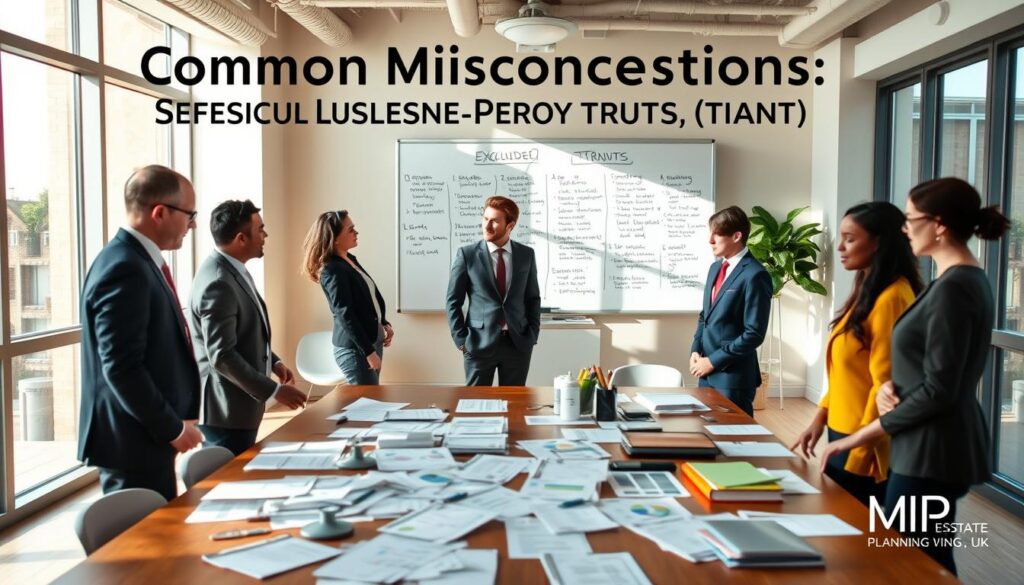It’s estimated that millions of pounds are lost annually to inheritance tax in the UK, a significant portion of which could be safeguarded with appropriate planning. For individuals, particularly non-UK domiciled persons, setting up an Excluded Property Trust can be a strategic move to protect their wealth.
An Excluded Property Trust allows individuals to shield their non-UK assets from UK inheritance tax, providing a powerful tool for protecting family assets. Historically, these trusts have been utilised by non-UK domiciled individuals to ensure their global wealth is distributed according to their wishes, without incurring significant tax liabilities.
Key Takeaways
- Excluded Property Trusts can safeguard non-UK assets from UK inheritance tax.
- These trusts are particularly beneficial for non-UK domiciled individuals.
- Proper planning can significantly reduce inheritance tax liabilities.
- Setting up an Excluded Property Trust can ensure that family assets are protected.
- It’s a strategic tool for those looking to manage their global wealth effectively.
What Are Excluded Property Trusts?
Excluded Property Trusts offer a unique solution for those seeking to shield their non-UK assets from inheritance tax. We will explore what these trusts entail, how they function, and their benefits.
Definition of Excluded Property Trusts
An Excluded Property Trust is a type of trust used primarily by non-UK domiciled individuals to protect their non-UK assets from UK inheritance tax. This type of trust is particularly beneficial for those with significant assets abroad, as it allows them to manage their wealth more effectively while minimizing tax liabilities.
How They Work in Practice
In practice, an Excluded Property Trust works by holding non-UK assets on behalf of the beneficiaries, typically family members or future generations. The trust is managed by trustees who are responsible for making decisions regarding the trust’s assets. By placing assets into this type of trust, individuals can ensure that their wealth is protected and distributed according to their wishes, without being subject to UK inheritance tax.
Key Benefits of Using These Trusts
The key benefits of Excluded Property Trusts include protection from UK inheritance tax, flexibility in managing non-UK assets, and the ability to preserve wealth for future generations. Let’s examine these benefits in more detail:
- Inheritance Tax Protection: Assets placed in an Excluded Property Trust are generally exempt from UK inheritance tax.
- Flexibility: Trustees can manage the trust assets according to the settlor’s wishes, allowing for flexible financial planning.
- Wealth Preservation: By shielding assets from inheritance tax, individuals can ensure that more of their wealth is preserved for their beneficiaries.
| Trust Type | UK Inheritance Tax | Non-UK Assets |
|---|---|---|
| Excluded Property Trust | Exempt | Protected |
| Other Trusts | Liable | Varies |
Excluded Property Trusts offer a valuable solution for non-UK domiciled individuals seeking to protect their assets from UK inheritance tax. By understanding how these trusts work and their benefits, individuals can make informed decisions about their estate planning.
Why Consider an Excluded Property Trust?
For individuals with significant wealth, an Excluded Property Trust offers a robust solution for UK inheritance tax planning. By setting up such a trust, you can ensure that your assets are protected and distributed according to your wishes.
One of the primary benefits of an Excluded Property Trust is its ability to shield assets from inheritance tax. For instance, if you have foreign assets, placing them in an Excluded Property Trust can provide a permanent shelter from inheritance tax, even if you later become UK domiciled. This can result in significant tax savings for your beneficiaries.
Protection from Inheritance Tax
Excluded Property Trusts are particularly effective in minimizing inheritance tax liabilities. By transferring assets into the trust, you can reduce the value of your estate, thereby decreasing the amount of inheritance tax payable. This is especially beneficial for individuals with substantial foreign assets.
- Assets placed in an Excluded Property Trust are generally excluded from the settlor’s estate for inheritance tax purposes.
- The trust can provide a tax-free environment for the growth of assets.
- Beneficiaries can receive distributions from the trust without incurring additional inheritance tax liabilities.
Estate Planning Benefits
Beyond inheritance tax benefits, Excluded Property Trusts offer significant advantages in terms of estate planning. They allow you to control how your assets are distributed after your passing, ensuring that your wishes are respected. For more information on estate planning strategies, you can visit our guide on estate protection plans.
- You can specify the beneficiaries and the conditions under which they receive the assets.
- The trust can be structured to provide for multiple generations, preserving family wealth.
- Assets within the trust are generally protected from creditors and legal claims.
Preservation of Wealth for Future Generations
An Excluded Property Trust is an effective tool for preserving wealth for future generations. By placing assets in the trust, you can ensure that they are managed and distributed in a way that benefits your family for years to come.
In conclusion, Excluded Property Trusts offer a range of benefits, from protection against inheritance tax to enhanced estate planning and wealth preservation. By understanding these advantages, you can make informed decisions about your estate planning needs.
Who Can Benefit from Excluded Property Trusts?
Understanding who can benefit from Excluded Property Trusts is crucial for effective estate planning. Excluded Property Trusts (EPTs) have emerged as a powerful tool for individuals looking to safeguard their wealth and ensure its distribution according to their wishes.

Individuals with High Net Worth
Individuals with significant assets can greatly benefit from EPTs. These trusts offer a means to protect wealth from potential creditors and ensure that assets are passed down to future generations without being eroded by taxes. For instance, asset protection trusts can be particularly beneficial for non-UK domiciled individuals with substantial assets.
Families with Significant Assets
Families with considerable wealth can also leverage EPTs to their advantage. By placing assets into an EPT, families can ensure that their wealth is preserved for future generations, while also minimizing the risk of assets being seized or dissipated due to unforeseen circumstances.
Retirees Looking to Protect Their Wealth
Retirees often find themselves in a position where protecting their wealth becomes a priority. EPTs can provide a secure way to manage and distribute their assets, ensuring that they are not exposed to unnecessary risks. This is particularly relevant for those who have worked hard to accumulate their wealth and wish to see it benefit their loved ones.
It is essential for individuals considering an EPT to consult with EPT specialists UK to tailor the trust to their specific needs and circumstances. Professional advice is invaluable in navigating the complexities of UK excluded property planning and ensuring that the trust is set up and managed effectively.
The benefits of EPTs are multifaceted, including:
- Protection of assets from creditors
- Minimization of inheritance tax liabilities
- Ensuring the smooth transfer of wealth to future generations
By understanding the advantages of EPTs and seeking the right professional guidance, individuals and families can make informed decisions about their estate planning needs.
Distinguishing Features of Excluded Property Trusts
The distinguishing features of Excluded Property Trusts make them an attractive option for individuals looking to protect their wealth. Excluded Property Trusts (EPTs) are designed to offer specific benefits that cater to the needs of certain individuals, particularly those with significant assets or international connections.
Legal Framework and Regulations
EPTs operate within a specific legal framework that has evolved over time, particularly with changes introduced by the Finance Act 2025. Understanding the current legislation is crucial for setting up and managing an EPT effectively.
The legal framework governing EPTs includes several key aspects:
- Regulations regarding the creation and administration of EPTs
- Tax implications and how EPTs are treated under UK tax law
- Requirements for reporting and compliance

Comparing to Other Trust Types
EPTs differ from other types of trusts in several significant ways. Unlike bare trusts or interest in possession trusts, EPTs are designed to exclude certain properties from being considered part of the settlor’s estate for tax purposes.
| Trust Type | Tax Treatment | Control and Flexibility |
|---|---|---|
| Excluded Property Trust | Excluded from settlor’s estate for tax purposes | High degree of control and flexibility |
| Bare Trust | Beneficiary is treated as the absolute owner for tax purposes | Limited flexibility |
| Interest in Possession Trust | Beneficiary has a right to income, treated as owning the trust assets | Moderate flexibility |
Essential Components of a Trust
For an EPT to be effective, it must include certain essential components. These include:
- A clear definition of the trust property
- Identification of the beneficiaries
- Appointment of trustees
- Specification of the trust’s terms and conditions
By understanding these distinguishing features, individuals can better appreciate how EPTs can be used to achieve their estate planning goals.
Setting Up an Excluded Property Trust
Understanding the intricacies of EPT rules in the UK is crucial for effective estate planning. Establishing an Excluded Property Trust (EPT) can be a strategic decision for individuals looking to protect their wealth from inheritance tax and ensure the financial security of their beneficiaries.
Step-by-Step Process to Establish a Trust
To set up an EPT, follow these essential steps:
- Identify the assets to be included in the trust.
- Choose a suitable trustee or trustees.
- Draft the trust deed, outlining the terms and conditions.
- Transfer the assets into the trust.
- Register the trust with the relevant authorities, if necessary.
For a detailed guide, you can refer to our Quick Guide to Excluded Property Trusts, which provides comprehensive information on the setup process.
Legal Requirements and Documentation
Compliance with legal requirements is paramount when establishing an EPT. The trust deed is a critical document that outlines the trust’s terms, including the powers of the trustees and the beneficiaries’ rights. Ensuring that the trust deed is correctly drafted is essential to avoid future disputes or legal challenges.
Key Legal Requirements:
| Requirement | Description |
|---|---|
| Trust Deed | A legal document outlining the terms of the trust. |
| Trustees | Individuals or entities responsible for managing the trust. |
| Beneficiaries | Those who will benefit from the trust assets. |
Choosing the Right Trustee
Selecting an appropriate trustee is a critical decision in the setup process. Trustees are responsible for managing the trust assets and ensuring that the trust is administered according to its terms. The choice of trustee can significantly impact the effectiveness of the EPT.

When choosing a trustee, consider their expertise, integrity, and ability to manage the trust assets prudently. In some cases, appointing a professional trustee may be beneficial to ensure that the trust is managed in accordance with the settlor’s wishes and the law.
Costs Associated with Excluded Property Trusts
Understanding the costs associated with Excluded Property Trusts is crucial for effective estate planning in the UK. While these trusts offer significant benefits, including protection from inheritance tax, there are various costs to consider.
Initial Setup and Ongoing Fees
Setting up an Excluded Property Trust involves initial costs, including legal fees for drafting the trust deed and other documentation. Ongoing management fees are also a consideration, as the trust will require administration and potentially professional management. For more information on setting up a trust, you can visit M&G Wealth.
| Cost Type | Description | Estimated Cost Range |
|---|---|---|
| Initial Setup Fees | Legal fees for drafting trust documents | £1,000 – £5,000 |
| Ongoing Management Fees | Annual administration and management costs | £500 – £2,000 |
Potential Tax Implications
While Excluded Property Trusts are designed to minimize inheritance tax liability, there may be other tax implications to consider, such as income tax and capital gains tax. It’s essential to consult with a tax professional to understand the specific tax implications of your trust.
For instance, if the trust generates income, this may be subject to income tax. Similarly, if the trust disposes of assets, capital gains tax may be applicable.
Risk of Hidden Costs
As with any complex financial arrangement, there is a risk of hidden costs associated with Excluded Property Trusts. These could include unforeseen administration costs or fees associated with making changes to the trust.
To mitigate these risks, it’s crucial to work with experienced professionals who can provide transparent guidance on all costs involved. Regular reviews of the trust’s administration can also help identify any potential hidden costs.

Common Misconceptions About Excluded Property Trusts
In the realm of UK estate planning, Excluded Property Trusts are frequently misunderstood, leading to missed opportunities for effective wealth management. We often encounter individuals who harbour misconceptions about these trusts, viewing them as overly complex or solely for the ultra-wealthy.

Myths Surrounding Inheritance Tax
One of the most prevalent misconceptions is that Excluded Property Trusts are primarily used to evade inheritance tax. While it’s true that these trusts can offer significant inheritance tax benefits, their role extends far beyond mere tax avoidance. For instance, they can be instrumental in protecting assets for future generations and ensuring that your estate is distributed according to your wishes.
For more detailed information on how Excluded Property Trusts can be used in conjunction with other estate planning tools to mitigate inheritance tax, you can visit our page on Inheritance Tax and Trust Funds.
Misunderstanding Trust Management
Another common misconception is that managing an Excluded Property Trust is overly complicated or requires specialized knowledge that most individuals lack. In reality, while the initial setup does require professional guidance, the ongoing management can be relatively straightforward, especially when you work with experienced EPT specialists in the UK.
It’s essential to understand that the trustee’s role is crucial in the management of the trust. Trustees are responsible for administering the trust assets according to the trust deed, ensuring that the settlor’s wishes are carried out.
Clarifying Separation from Other Estate Planning Tools
Some individuals mistakenly believe that Excluded Property Trusts are redundant or overlap significantly with other estate planning tools. However, these trusts offer unique benefits that complement other strategies. For example, they can provide a layer of protection for assets that are not covered by other estate planning measures.
By understanding the distinct advantages of Excluded Property Trusts and how they can be integrated into a comprehensive estate plan, individuals can make more informed decisions about their wealth management. We recommend consulting with professionals who specialize in UK excluded property planning to get personalized advice tailored to your specific circumstances.
The Role of Professional Advisors
Professional advisors play a pivotal role in the successful establishment and management of Excluded Property Trusts (EPTs). Their expertise is crucial in navigating the complexities of UK EPT legislation and ensuring that the trust is set up and managed effectively.
Importance of Consulting a Solicitor
Consulting a solicitor who specializes in EPTs is essential for several reasons. Firstly, they provide guidance on the legal framework governing EPTs in the UK, ensuring compliance with all relevant laws and regulations. Secondly, they help in drafting the trust deed and other necessary documents, tailoring them to the specific needs of the settlor and beneficiaries.
Key benefits of consulting a solicitor include:
- Expert knowledge of UK EPT legislation
- Personalized advice tailored to individual circumstances
- Assistance with legal documentation and compliance
Engaging Financial Advisors
Financial advisors bring a wealth of knowledge regarding investment strategies and wealth management, which are critical components of managing an EPT. They help in making informed decisions about the trust’s assets, ensuring that the investments align with the trust’s objectives and the beneficiaries’ needs.
The role of financial advisors includes:
- Developing investment strategies that maximize returns while minimizing risk
- Providing ongoing portfolio management and monitoring
- Offering advice on tax-efficient investment options
The Value of Experienced Trust Professionals
Experienced trust professionals, including EPT specialists in the UK, offer invaluable insights and practical guidance on trust administration. They are well-versed in the intricacies of trust law and can help navigate any challenges that arise during the trust’s operation.

Their expertise ensures that the trust is administered efficiently, in accordance with the settlor’s wishes and the beneficiaries’ best interests. By leveraging their knowledge, individuals can maximize the benefits of their EPT, achieving their estate planning goals.
Case Studies: Success Stories of Excluded Property Trusts
The effectiveness of Excluded Property Trusts (EPTs) in preserving wealth is best illustrated through real-life case studies. These trusts have been instrumental in helping individuals and families in the UK protect their assets and plan for the future.
Real-Life Examples of Wealth Preservation
One notable case involved a successful business owner who established an EPT to safeguard his family’s wealth. By transferring his business interests into the trust, he was able to reduce his taxable estate, thereby minimizing the impact of UK inheritance tax. This strategic move ensured that his children and grandchildren could inherit the business without facing a significant tax burden.
Another example is a family who used an EPT to protect their property portfolio. By placing their rental properties into the trust, they were able to shield these assets from potential creditors and reduce their exposure to inheritance tax. This not only preserved their wealth but also provided a secure financial future for their heirs.
Lessons Learned from Effective Trust Management
Effective management of an EPT is crucial to its success. One key lesson learned from our case studies is the importance of regularly reviewing and updating the trust’s assets and beneficiaries. This ensures that the trust remains aligned with the settlor’s intentions and adapts to any changes in their circumstances or the law.
Another important consideration is the selection of trustees. Our case studies have shown that appointing experienced and trustworthy individuals or professionals can significantly enhance the trust’s effectiveness. These trustees play a vital role in managing the trust’s assets and making informed decisions that benefit the beneficiaries.
Insights from Financial Experts
Financial experts emphasize that EPTs are a valuable tool in UK inheritance tax planning, offering a flexible and effective way to protect wealth. By leveraging these trusts, individuals can achieve significant tax savings and ensure that their assets are distributed according to their wishes.
Moreover, experts highlight the importance of integrating EPTs into a comprehensive estate plan. When used in conjunction with other estate planning strategies, EPTs can provide a robust framework for wealth preservation and succession planning.
Future Trends in Excluded Property Trusts
The landscape of Excluded Property Trusts (EPTs) in the UK is on the cusp of significant changes, driven by evolving tax laws and innovative estate planning strategies. As we navigate these changes, it’s essential to understand how EPTs will continue to serve as a powerful tool in protecting family wealth.
Changes in UK Tax Laws Impacting EPTs
Recent changes in UK tax laws, such as those introduced by the Finance Act 2025, are set to impact EPTs significantly. We anticipate that these changes will lead to a more complex tax environment, making it crucial for individuals and families to stay informed about how these laws affect their EPTs.
Some key aspects to watch include:
- Potential adjustments to inheritance tax reliefs
- Changes in the treatment of trust assets for tax purposes
- Increased scrutiny of trust structures by HMRC
For more information on how the new inheritance tax rules may affect your family’s future, visit our detailed guide.
Innovations in Estate Planning Strategies
Estate planning is not just about complying with current laws; it’s about staying ahead of the curve. Innovations in estate planning strategies are continually emerging, offering new ways to protect and pass on wealth. Some of these innovations include:
- Using technology to manage and monitor trust assets more effectively
- Developing more sophisticated trust structures to address complex family situations
- Incorporating sustainable and ethical considerations into investment strategies
These advancements are making EPTs more versatile and effective, allowing families to achieve their long-term goals with greater precision.
Predictions for Trust Use in the Next Decade
Looking ahead to the next decade, we predict that EPTs will become an increasingly important component of estate planning in the UK. As the tax landscape continues to evolve, individuals and families will turn to EPTs as a reliable means of protecting their wealth and ensuring the financial security of future generations.
Some key trends we expect to see include:
- Increased use of EPTs as a means of mitigating the impact of future tax changes
- Greater emphasis on flexibility and adaptability in trust structures
- A growing demand for professional advice and guidance in setting up and managing EPTs
By staying informed about these trends and working with experienced professionals, individuals and families can maximize the benefits of EPTs and secure their financial futures.
Conclusion: Maximising the Power of Excluded Property Trusts
As we have explored, excluded property trusts UK offer a robust solution for protecting family assets and minimising inheritance tax liabilities. By understanding the intricacies of UK excluded property planning, individuals can ensure their wealth is preserved for future generations.
Key Takeaways
Excluded property trusts provide a powerful means of shielding assets from inheritance tax, while also offering flexibility in estate planning. The trusts are particularly beneficial for individuals with high net worth, families with significant assets, and retirees seeking to safeguard their wealth.
Implementation and Professional Guidance
To maximise the benefits of excluded property trusts, it is essential to seek professional guidance. Experienced solicitors and financial advisors can help navigate the complexities of trust establishment and management, ensuring compliance with UK regulations.
By leveraging excluded property trusts UK and UK excluded property planning strategies, individuals can create a secure financial future for their loved ones. We recommend consulting with a qualified professional to explore how these trusts can be tailored to meet specific needs and goals.


